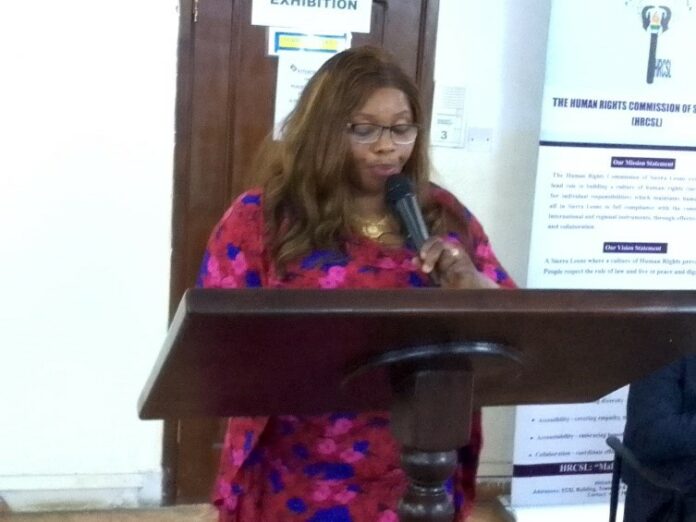By Yusufu S. Bangura
On Thursday, June 20th, Patricia Narsu Ndanema, Chairperson of the Human Rights Commission for Sierra Leone (HRCSL), highlighted the crucial role of journalists in human rights reporting.
Speaking during a one-day training session on a Human Rights-Based Approach to News Reporting at the Peace Museum, Special Court in Freetown, Ndanema stressed that collaboration and participation of journalists are integral in promoting public policy agendas.
Ndanema noted that journalists have the freedom of speech and press, which are vital in advancing human rights issues, such as free assembly and the circulation of ideas. However, she urged journalists to avoid misinformation and disinformation, as they are viewed as informed members of society.
“Journalists’ collaboration and participation are key in promoting set agendas for public policy on reporting human rights-related issues. Misinformation, often spread by bloggers and occasionally journalists, undermines this effort. This training aims to build journalists’ capacity to report on human rights issues with balance and objectivity,” she said.
Victor I. Lansana, Vice Chairperson of the Commission, spoke on the importance of understanding the legal framework for court reporting. He emphasized the need for accuracy and fairness to help the public better understand legal issues and protect the privacy and dignity of individuals involved in sexual offenses.
Lansana underscored the significance of good human rights reporting, stating that accurate records hold all parties accountable for their statements and actions during legal proceedings. This accountability can help verify facts, resolve disputes, and promote transparency in the legal process.
“Accurate reporting is essential for advocacy efforts, as it provides reliable information that can mobilize support to address human rights violations and hold governments and other actors accountable,” he added.
Alhaji Manika Kamara, National Secretary General of the Sierra Leone Association of Journalists, commended the training as a vital step in strengthening journalists’ capacity to report on human rights issues. He emphasized that the workshop would enhance journalists’ understanding of human rights principles, focusing on dignity, equality, and respect.
Kamara highlighted that the training would help journalists report stories that reflect diverse voices and advocate for justice and accountability, particularly for marginalized communities. He urged journalists to familiarize themselves with local and international laws, treaties, and conventions related to human rights.
Millicent Kargbo, Acting Director of the Directorate of Education, Communication, and Training at HRCSL and one of the facilitators, noted that the Directorate’s responsibility includes educating individuals about the Commission’s functions. She stressed that reporting on human rights issues requires specialized skills to ensure accurate information dissemination.
Foday M. Conteh, a journalist with Calabash Newspaper, expressed appreciation for the training, stating it deepened his knowledge of human rights reporting and provided guidance on local and international legal instruments. Marion Precious George, a reporter for AfriRadio, stated that the training had equipped her to report well-balanced and accurate human rights stories without fear or prejudice.





